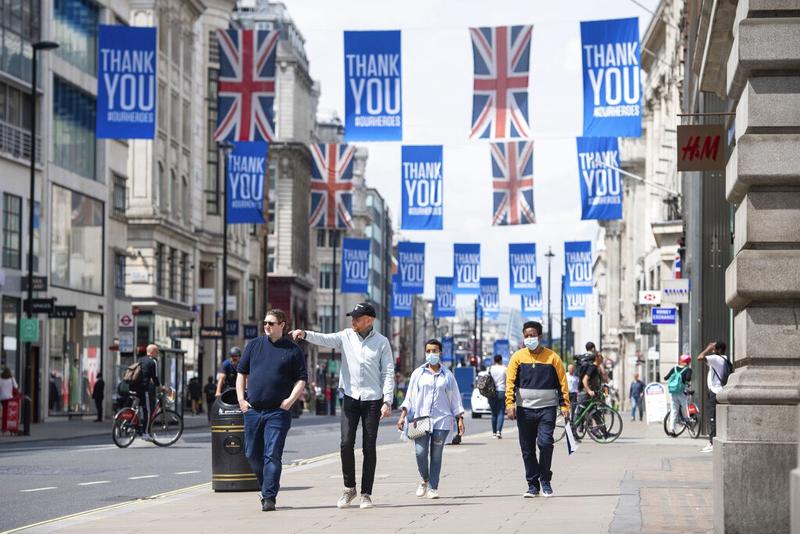 People walk on Oxford Street in London, June 17, 2020, as further coronavirus lockdown restrictions are lifted in England. (DOMINIC LIPINSKI / PA VIA AP)
People walk on Oxford Street in London, June 17, 2020, as further coronavirus lockdown restrictions are lifted in England. (DOMINIC LIPINSKI / PA VIA AP)
NEW YORK / MEXICO CITY / LONDON / RIO DE JANEIRO / HAVANA / OTTAWA / FRANKFURT / CAPE TOWN / MOSCOW / PRAGUE / OSLO / KIEV / ZURICH / WARSAW - The United Kingdom's chief medical officers have agreed that the COVID-19 threat level should be lowered one notch to "epidemic is in general circulation" from "transmission is high or rising exponentially".
The Joint Biosecurity Centre recommended the COVID-19 alert level should move from Level 4 (A COVID-19 epidemic is in general circulation; transmission is high or rising exponentially) to Level 3 (A COVID-19 epidemic is in general circulation).
"There has been a steady decrease in cases we have seen in all four nations, and this continues," the chief medical officers of England, Wales, Scotland and Northern Ireland said. "It does not mean that the pandemic is over. The virus is still in general circulation, and localised outbreaks are likely to occur."
"There has been a steady decrease in cases we have seen in all four nations, and this continues," the chief medical officers of England, Wales, Scotland and Northern Ireland said
The death toll from confirmed cases of COVID-19 in the UK rose by 173 to 42,461, health officials said on Friday.
Earlier Friday, the government said schools in England will receive extra funding worth 1 billion pounds (US$1.24 billion) over the 2020-2021 academic year to help them deal with the impact of lost teaching time during the lockdown.
On Thursday, the government said Britain will switch to the Apple and Google model for its COVID-19 test-and-trace app, ditching an attempt to develop an app by itself after the homegrown system did not work well enough on Apple's iPhone. Health Minister Hancock declined to set a date for when the app would be rolled out.
ALSO READ: Germany rolls out COVID-19 tracing app to fight second wave
Also on Thursday, First Minister of Scotland Nicola Sturgeon announced that Scotland was ready to move to the second phase of its plan to ease the coronavirus lockdown.
In Northern Ireland, First Minister Arlene Foster announced that schools in the region will have a social distancing rule of 1 meter rather than 2 meters as required in England when they reopen in August.
Meanwhile, the Daily Telegraph newspaper reported that Prime Minister Boris Johnson is expected to announce on June 29 that agreements have been reached for air bridges with a "small number" countries with low levels of the coronavirus outbreak.
Global tally
The number of coronavirus cases worldwide topped 8.5 million on Friday, according to the Center for Systems Science and Engineering (CSSE) at Johns Hopkins University.
Meanwhile, global COVID-19 deaths surpassed 450,000 on Thursday, according to the CSSE.
The United States reported the most COVID-19 cases and deaths, with nearly 2.2 million cases and more than 118,000 deaths. Other countries with over 20,000 fatalities include Brazil, Britain, Italy, France and Spain, the CSSE data showed.
Argentina
Coronavirus cases may peak in Argentina sometime between the end of June and beginning of July despite cases and virus-related deaths increasing at a faster pace, according to Health Minister Gines Gonzalez Garcia.
That timeline comes as Argentina recorded 35 COVID-related deaths Wednesday, its highest one-day number since the pandemic began. Cases are also growing at a faster pace in part because the virus has reached densely-populated, low-income neighborhoods in the metro area of Buenos Aires.
Argentina ranks 34th worldwide in COVID-19 cases with 35,552 confirmed infections, according to Johns Hopkins University’s tally.
Brazil
Brazil's Health Ministry reported new COVID-19 statistics on Thursday showing the country fast approaching 1 million confirmed coronavirus cases and 50,000 deaths.
With the world's worst outbreak outside the United States, Brazil now has 978,142 confirmed cases and 47,748 deaths, up 1,238 from Wednesday, the ministry said.
It was the third day Brazil reported more than 1,000 deaths.
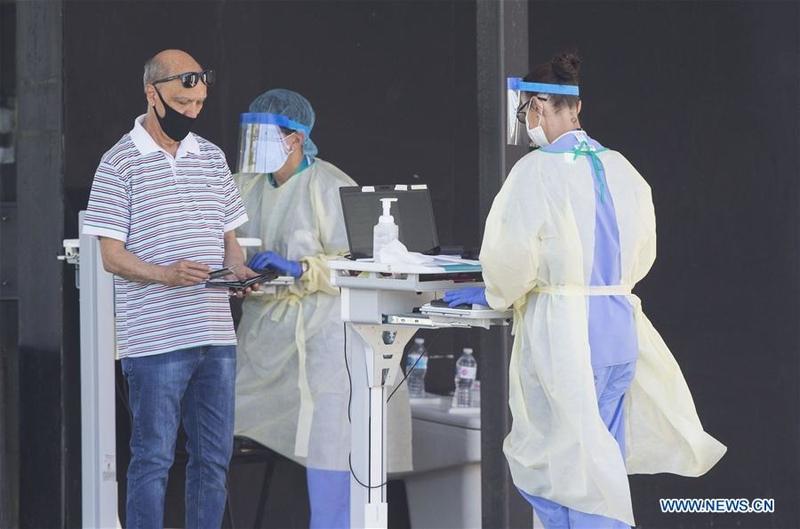 A man wearing a face mask registers for testing at a COVID-19 assessment center at a hospital in Toronto, Canada, on June 18, 2020. (ZOU ZHENG / XINHUA)
A man wearing a face mask registers for testing at a COVID-19 assessment center at a hospital in Toronto, Canada, on June 18, 2020. (ZOU ZHENG / XINHUA)
Canada
Canada officially racked up 100,000 cases of the novel coronavirus on Thursday and although the outbreak is slowing, health experts said major challenges remain.
While the 10 provinces are slowly reopening their economies, major restrictions remain in place in Montreal and Toronto, Canada's two biggest cities.
The province of Ontario on Thursday announced another 190 cases a day after public health agency data showed 99,853 people had been diagnosed positive. That pushed Canada over the 100,000 mark and into 17th place on the global list.
Canada has recorded at least 8,266 deaths, in 12th place worldwide, according to data compiled by Reuters.
Prime Minister Justin Trudeau - identifying complacency as a major threat - unveiled a tracing app which would be voluntary due to privacy concerns. The app, he said, would be anonymous.
Chile
Chile on Thursday said a total of 225,103 people in the country have tested positive for COVID-19 and 3,841 people have died
In the past 24 hours ending 9 pm Wednesday (0100 GMT Thursday), health centers detected 4,475 new cases of infection and 226 more deaths were recorded.
"We are soon going to reach one million tests. We are the Latin American country that carries out the most tests to detect the coronavirus per million inhabitants," newly-appointed Health Minister Enrique Paris told reporters at a press conference.
Paris stressed the need for people to continue to stay at home and practice social distancing, especially in the capital Santiago and the metropolitan area and in Valparaiso, the two hardest-hit regions.
Croatia
Croatia recorded a notable surge in COVID-19 infections as 11 new cases were confirmed in the last 24 hours, the government announced on Thursday.
After nearly a month with no or less than five daily new cases, the sharp increase raised concern about a potential second wave of the COVID-19 outbreak.
Health Minister Vili Beros said on Thursday that the situation was under control. He said the virus was brought from Croats who were traveling in the neighboring countries that are recording spikes in new infections.
Croatia has so far reported 2,269 confirmed cases and 107 deaths as of Thursday afternoon, according to Croatian Institute of Public Health.
Cuba
In much of Cuba, restaurants welcomed back customers on Thursday while families escaped cities for the beaches as the government started to ease the Caribbean island's three-month-old lockdown restrictions after curbing the coronavirus outbreak there.
Only the capital and neighboring Matanzas province have reported new cases in recent weeks.
International tourism, a key source of hard currency, would re-start in July albeit only with travelers arriving via charter flights and tested upon arrival for the coronavirus.
Cuba has so far reported 2,295 confirmed cases and 85 deaths, according to Johns Hopkins University's tally.
Czech Republic
The Czech Republic reported its biggest one-day jump in new coronavirus cases in two months on Friday, with the daily rise exceeding 100 for only the third time since mid-April.
The number of new cases was 118 on Thursday, the Health Ministry said, the largest daily rise since April 21. The central European country has since May been relaxing rules to contain the spread of the novel coronavirus.
The country had reported 10,283 cases as of Friday morning, of which almost three quarters have recovered. Its death toll of 334 is a fraction of those seen it its western neighbours.
According to health officials, the country has two hot spots in Prague and the eastern mining region of Karvina.
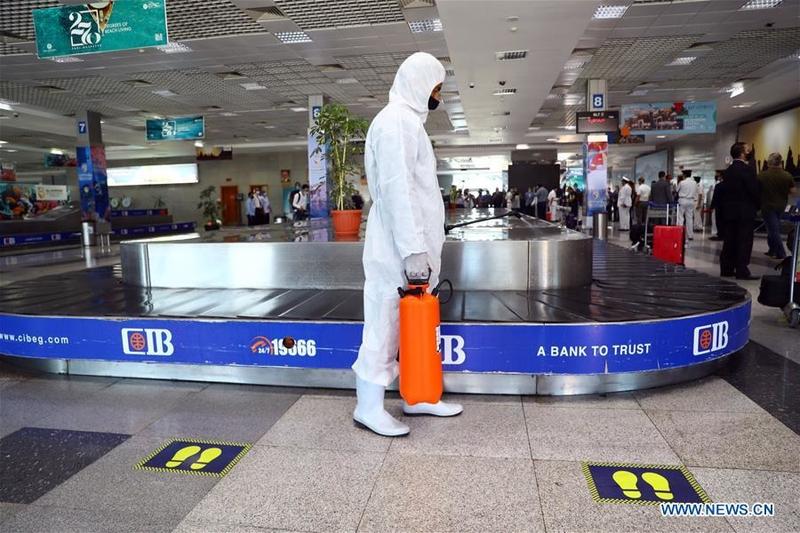 A worker sprays disinfectant at Hurghada Airport in Hurghada, Egypt, on June 18, 2020. (AHMED GOMAA / XINHUA)
A worker sprays disinfectant at Hurghada Airport in Hurghada, Egypt, on June 18, 2020. (AHMED GOMAA / XINHUA)
Egypt
Egypt said it registered 1,218 new cases of the new coronavirus on Thursday, edging the total number of cases up to more than 50,000 a fortnight before it is set to further ease restrictions.
The Health Ministry on Thursday said it registered a total of 50,437 cases of the coronavirus and 1,938 deaths. The country's higher education minister cited a study on June 1 estimating that the actual number of cases could be up to five times higher than the figure reported.
France
The number of people who died from coronavirus infection in France rose by 28 to 29,603 on Thursday, the same increase as Wednesday, but the number of new confirmed cases crept up again to reach a five-day high.
Those cases rose by 467, at 158,641, a figure above the daily average of 440 seen over the last seven days. Since the beginning of the month of June, that average stands at 383.
France's death toll is the fifth-highest in the world.
Germany
Germany recorded a jump in new coronavirus cases, though the number remained far below the level at the height of the outbreak and the latest infection rate was unchanged.
There were 1,213 new infections in the 24 hours through Friday morning, bringing the total to 189,817, according to data from Johns Hopkins University. That compares with 352 the previous day. Fatalities increased by 24 to 8,875.
The reproduction factor of the virus was unchanged at 0.86 on Thursday, according to the latest daily report by the Robert Koch Institute (RKI).
According to data from RKI on Friday, the number of confirmed cases increased by 504 to 188,534 while the the reported death toll rose by 16 to 8,872.
Around 730 workers at a slaughterhouse in the German state of North Rhine-Westphalia (NRW) have tested positive for the novel coronavirus as of Thursday, German news agency DPA reported.
Local authorities had ordered the Toennies Group meatpacking plant in Rheda-Wiedenbrueck in the district of Guetersloh to be temporarily closed on Wednesday.
Meanwhile, around 7,000 people are under quarantine in Guetersloh.
Honduras
Honduran President Juan Orlando Hernandez has been evolving favorably as he receives treatment at a military hospital for pneumonia after testing positive for COVID-19, but could remain hospitalized nearly another week, one of his doctors said on Thursday.
"I can inform you the president's evolution so far has been satisfactory. He has not shown any type of pulmonary deterioration or of his general condition," internal medicine specialist Cesar Carrasco said at a news conference from the military hospital.
"He is stable and is not showing symptoms of respiratory distress, but he does always have some fatigue when he walks around his room," said Carrasco, adding that Hernandez could remain hospitalized five or six more days.
The Central American country has so far confirmed 10,739 coronavirus cases and 343 deaths.
Hungary
Hungary recorded no coronavirus-related deaths for the first time since April 25, according to a daily count on a government website.
Since the pandemic reached the country, Hungary has reported 568 deaths related to COVID-19 and 4,081 confirmed cases. Active cases, which don’t include those who’ve recovered from the virus, fell to 932 by Friday.
Hungary's government will take the necessary legal and economic measures to protect lives in case there is a second wave of the novel coronavirus epidemic, Prime Minister Viktor Orban told state radio on Friday.
"If there are signs pointing to a second wave (of the virus) coming, we will not hesitate to take the necessary legal and economic steps," Orban said.
Italy
The coronavirus was present in Milan and Turin’s sewage systems as early as December, two months before the first COVID-19 cases were detected in Italy, a new study shows.
The Italian National Institute of Health looked at 40 sewage samples collected from wastewater treatment plants in northern Italy between October 2019 and February 2020. An analysis released late on Thursday said samples taken in Milan and Turin on Dec 18 showed the presence of the SARS-Cov-2 virus.
Giuseppina La Rosa, an expert in environmental wastewater at the Italian National Institute of Health who co-led the research, said the presence of the virus in the Italian waste samples did not "automatically imply that the main transmission chains that led to the development of the epidemic in our country originated from these very first cases".
Hospital tests in the coastal region of Liguria have also indicated the likelihood that the virus was present in the country at the end of last year, Italian newspapers have reported.
Italy reported 66 more COVID-19 deaths and 333 new cases on Thursday, the Civil Protection Agency said, pushing the death toll to 34,514 and the tally to 238,159.
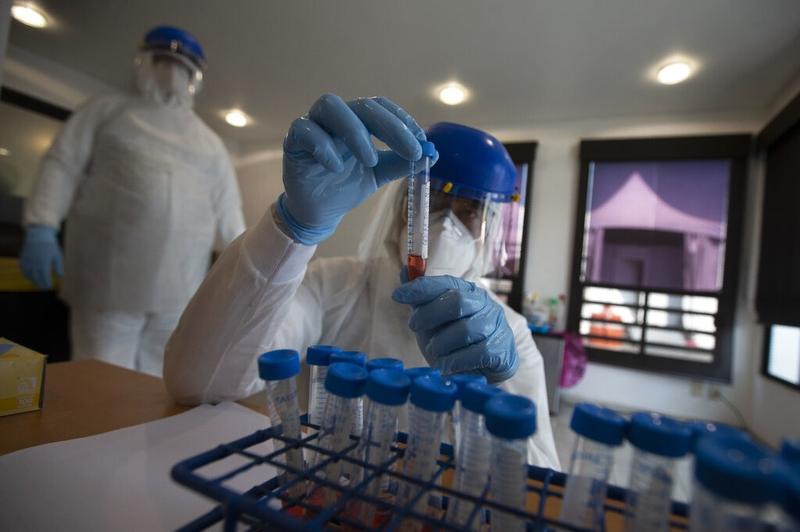 A health worker disinfects his co-worker at the medical unit of the Central de Abasto market in Mexico City, June 18, 2020. (MARCO UGARTE / AP)
A health worker disinfects his co-worker at the medical unit of the Central de Abasto market in Mexico City, June 18, 2020. (MARCO UGARTE / AP)
Mexico
Mexico's Health Ministry reported on Thursday a record 5,662 new confirmed cases of coronavirus infections and 667 additional fatalities, bringing the total in the country to 165,455 cases and 19,747 deaths.
Mexico has repurposed a Formula One racetrack, converted a huge convention center and put hundreds of beds into military barracks to create new hospital space to ease the strain on its health system in the mounting coronavirus pandemic.
The Mexican army, which has a tradition of providing humanitarian aid after earthquakes and hurricanes, reconditioned three barracks into clinics, and added 400 hospital beds.
Meanwhile, the navy built so-called voluntary isolation centers in the city to house patients with mild symptoms.
Authorities have also put another 200 beds in a temporary hospital inside an convention center and established a similar clinic at a racetrack typically used for Formula One and rock concerts.
READ MORE: WHO drawing up plans for 'fair, equitable' access to virus vaccine
Montenegro
The government of Montenegro decided on Thursday to once again make the use of protective face masks mandatory in all public places in order to prevent a new outbreak of COVID-19.
The government declared on May 24 that the country was "corona-free" with zero active cases, but since last weekend it has confirmed new cases. Currently, the country has nine active cases, of which seven were confirmed on Wednesday.
"The majority of the active cases of COVID-19 in Montenegro were imported from Serbia, because irresponsible individuals entered Montenegro across Bosnia and Herzegovina," the government said on Twitter.
Montenegro has temporarily removed Bosnia and Herzegovina from the list of countries whose citizens can enter Montenegro without institutional isolation.
Since the beginning of the outbreak, 333 cases of COVID-19 have been confirmed in Montenegro.
Morocco
A total of 77 new COVID-19 cases were confirmed in Morocco on Thursday, bringing the total number of coronavirus cases in the country to 9,074.
The number of recoveries increased by 48 to 8,041, said Hind Ezzine, head of the Department of Epidemic Diseases of the Ministry of Health, at a regular press briefing.
Ezzine said the country's COVID-19 death toll stood at 213, as no new fatalities were recorded in the last 24 hours.
Norway
Norway, which has some of the strictest travel restrictions in Europe, must maintain tight control of its borders to avoid importing COVID-19 cases from abroad, Prime Minister Erna Solberg said on Friday.
"There is still a danger of new infections ... Cases of infection coming from abroad is the biggest danger today," Solberg told parliament. "So it is important to keep control."
As of Thursday, Norway had identified a total of 8,692 confirmed COVID-19 cases, with 244 deaths. It has estimated that no more than 1 percent of its 5.4 million population has been infected since the outbreak began.
Poland
Poland will allow aircraft to fly with all their seats occupied as of July 1, Deputy Prime Minister Jadwiga Emilewicz said on Friday.
Poland has been easing lockdown restrictions related to the coronavirus pandemic, and opened its borders with other European Union countries on June 13.
Portugal
The Portuguese Council of Ministers approved on Thursday new measures under the "Economic and Social Stabilization Program," which aims to reactivate the economy by providing support to companies and stabilizing the employment after the economic crisis caused by the COVID-19 pandemic.
The council extended until July a scheme in which employees will receive 70 percent of their salary directly from the government.
The government will also provide an "extraordinary incentive to normalize business activity for employers" who have kept employment contracts amid the pandemic, according to a statement from the Council of Ministers.
Portugal registered one COVID-19 death in the past 24 hours, pushing the death toll to 1,524, while 417 new cases were reported in the same period, raising the tally to 38,089.
Russia
Russia on Friday reported 7,972 new cases of the novel coronavirus, pushing its nationwide case tally to 569,063 since the crisis began.
The national coronavirus response centre said 181 people had died in the last 24 hours, bringing the official death toll to 7,841.
Slovakia
Slovakia’s health authorities will allow shops to open on Sundays because the pandemic is under control, Premier Igor Matovic said.
From Saturday, temperatures will no longer be taken for people entering state buildings or public places like swimming pools. The state will also allow crowds larger than 1,000 people from July, Matovic said.
Also from Saturday, the country will fully open its borders with Poland from Saturday, adding its northern neighbor to 19 countries with unrestricted travel.
Slovakia has so far reported 1,576 confirmed cases and 28 deaths, according to Johns Hopkins University's tally.
It reported 14 cases on Thursday, the biggest daily rise since May 15. But it has gone over a month without reporting any deaths from the illness.
Slovenia
Concerned about the biggest rise in new cases of coronavirus in seven weeks, Slovenia will introduce an obligatory 14-day quarantine from Friday for most people coming from Serbia, Bosnia and Kosovo, the government said on Thursday.
The government could also increase restrictions inside the country if the virus continues to spread, Health Minister Tomaz Gantar said.
Earlier on Thursday, Slovenia reported eight new cases, the highest daily number of new infections since April 29. Most cases over the past two weeks have been imported from abroad or through contacts with people coming from abroad. So far the country has confirmed a total of 1,511 cases and 109 deaths.
In May, Slovenia became the first European country to declare an end to its coronavirus outbreak, although some restrictions remain in place.
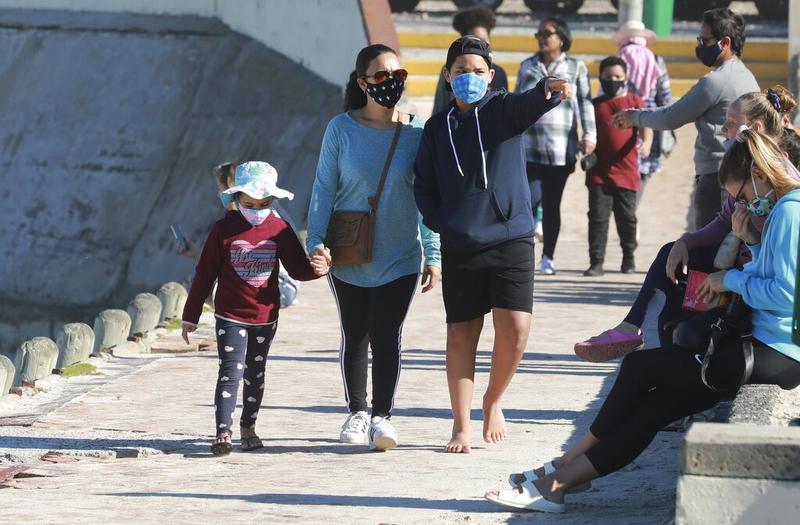 People wearing face masks walk on the beach at Muizenberg, Cape Town, South Africa, June 16, 2020. (NARDUS ENGELBRECHT / AP)
People wearing face masks walk on the beach at Muizenberg, Cape Town, South Africa, June 16, 2020. (NARDUS ENGELBRECHT / AP)
South Africa
South African Health Minister Zweli Mkhize on Thursday urged South Africans to prepare for "a heavy storm" as COVID-19 cases continued to rise.
The minister made the appeal as the death toll in the country hit 1,737, up by 63 from Wednesday.
A total of 3,488 cases were reported over the past 24 hours, bringing the nationwide count to 83,890, according to local health authorities.
Mkhize warned that the country was approaching "a heavy storm" in its fight against the coronavirus pandemic with the further easing of restrictions. Before the lockdown, cases were doubling every two days and now cases were doubling every 12 days and, in some areas, every nine days, according to Mkhize.
Spain
Spain reported on Friday a total of 28,313 coronavirus deaths as of Thursday, after adjusting its database to avoid duplications and errors, a health ministry official said.
The death toll series had not been updated since June 7, when Spain reported 27,136 deaths, while the country was implementing a new methodology for logging deaths and cases.
Switzerland
Switzerland will allow events of up to 1,000 people again from next week as cases of the new coronavirus wane, the government said on Friday, declaring their country better equipped to handle any fresh flare-ups.
"As of Monday, June 22, the measures put in place to tackle the coronavirus will for the most part be lifted. Only the ban on large-scale events will remain in place until the end of August," the cabinet said.
More than 31,000 people have tested positive for the virus and 1,680 have died of COVID-19 since the first case was reported in late February, according to authorities.
New cases have dwindled to a few dozen a day, allowing Switzerland to reopen schools, shops and borders with fellow members of the Schengen passport-free travel zone as life returns to near-normal. But the economy, like many others, is in a sharp recession.
Ukraine
Another 921 people have tested positive for COVID-19 in Ukraine in the past 24 hours, taking the total tally of confirmed cases to 34,984, the country's health ministry said Friday.
Among them, 16,033 patients have recovered, while 985 people have died, the ministry said.
As of Friday, 2,570 children and 5,877 health workers have been diagnosed with COVID-19 in Ukraine, it said.
Ukrainian Health Minister Maxym Stepanov told a daily briefing here on Friday that strict quarantine measures will resume due to the worsening epidemiological situation in certain regions of Ukraine.
US
California, North Carolina and a string of US cities mandated or urged mandatory mask use on Thursday to get a grip on spiraling coronavirus cases as at least six states set daily records.
Florida posted 3,207 new cases, its second daily record in a week, California registered over 4,000 new cases for the second day and Arizona also posted another daily case record.
New York City will begin phase two of reopening on Monday, Mayor Bill de Blasio said on Thursday, citing continued improvements in coronavirus data. Offices, in-store retail, outdoor dining, hair salons and barbershops are among the businesses allowed to reopen their doors during phase two.
More than 2.18 million confirmed cases have been reported in the Untied States as of Thursday evening, with over 118,000 deaths, according to data from Johns Hopkins University.


